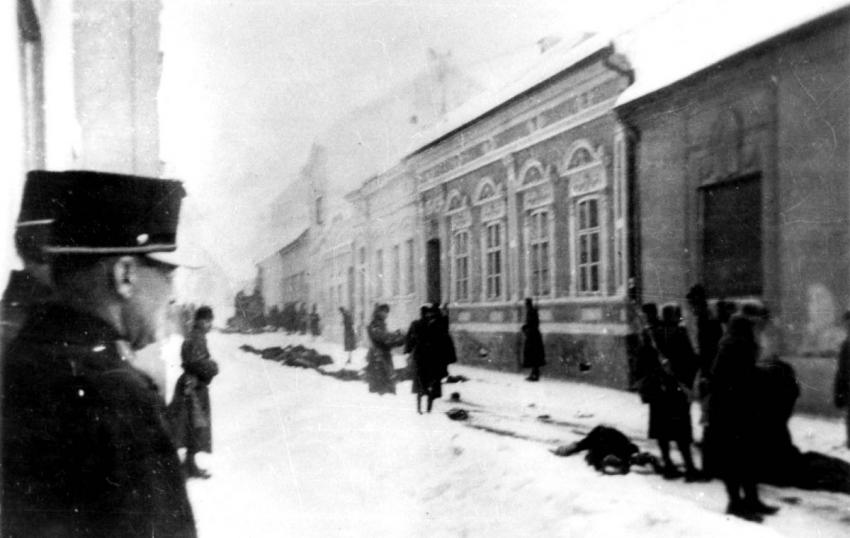In April 1941, Hungarian forces entered Novi-Sad. When a small underground group operating against them was discovered, the Hungarians cut the area off from the rest of the country and put it under curfew. For three days, from the 21-23 of January 1942, with the city completely surrounded, Hungarian soldiers ran wild and committed numerous atrocities. In temperatures of 20° below zero and in heavy snow, 500 Serbs and 800 Jews were taken from their homes and brought to killing pits or the shores of the Danube and murdered. In April 1944 the Germans rounded up the rest of the Jews of Novi-Sad, an estimated 1,600 people, and deported them to Auschwitz.
During World War II, Novi-Sad was located in the Bačka district of northern Serbia, Yugoslavia. Of its 61,000 residents, some 2,400 were Jews. In April 1941, as part of the Axis forces' invasion of Yugoslavia, Hungarian forces occupied Novi-Sad and immediately began terrorizing the Jewish and Serb residents. Men between the ages of 16-65 were enlisted in labor battalions. Some were sent to the front, primarily in Ukraine, where they were forced to clear land mines, most of them dying in the process.
Following clashes with partisans in the area of Novi-Sad in late 1941 and early 1942, the Hungarian government under Miklos Horthy established two military units and sent them out against the Jews and Serbs in Bačka. In early January 1942, these forces murdered hundreds of Jews in the villages surrounding Novi-Sad. For three days, from 21-23 January 1942, with the city completely surrounded, cut off from the rest of the country and put under curfew, Hungarian soldiers ran wild and committed numerous atrocities. In temperatures of 20° below zero and in heavy snow, people were taken from their homes and brought to killing pits or the shores of the Danube and murdered. During the slaughter, known as the “Ratzia”, 500 Serbs and 800 Jews were murdered, including women, children and the elderly. By 23 January, more than 5,000 people from the Bačka district, half of them Jews, had been murdered. Six Jewish communities were obliterated.
The slaughter provoked outrage in neutral countries, including Switzerland, Sweden, Spain and Turkey. In March 1942, Miklós Kállay was appointed Prime Minister of Hungary and confessed to the killing of innocent people. In 1942, most of the murderers were put on trial, and some of them imprisoned, but they escaped to Germany, and returned to Hungary in March 1944 with the German Army. One month after their return, they arrived in the Bačka region together with German SS units and Hungarian gendarmes, and participated in the deportation of the 1,600 Jews of Novi-Sad to Auschwitz. In May, over 8,000 Jews from the Bačka district were deported to extermination in Auschwitz and other camps. Some 2,500 Jews of the 16,000 Jews of Bačka survived the Holocaust.

